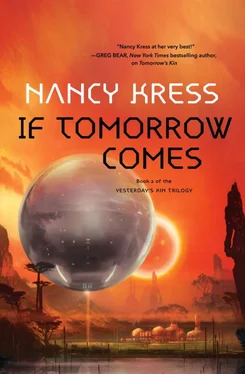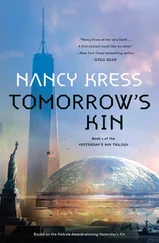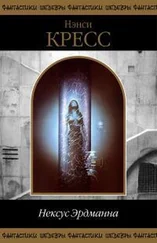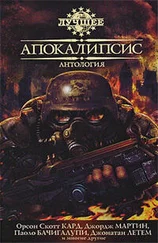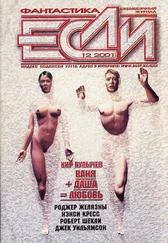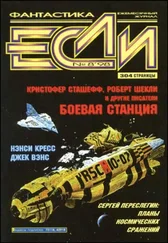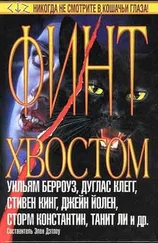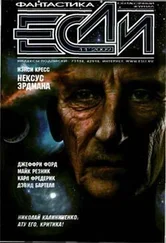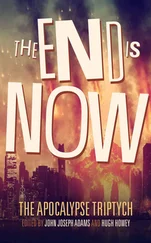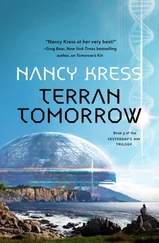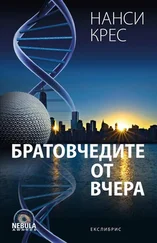He said, stalling, “You know these people a lot better than I do—is there going to be what Tony Schrupp says, rioting and looting and a general breakdown?”
“I don’t know,” Isabelle said, “but I don’t think so. You know what, Leo—I think we all see the world mostly like we are inside. Tony was always a suspicious grabber, and so he’s suspicious about grabbing. That’s why he built Haven. Marianne has always put her faith in science, and she still does. And you were always a leader underneath, making your own judgments, and so now you can lead the unit.”
“You don’t know me, Isabelle. I was no leader.”
“Maybe you were and didn’t know it. We might need an army, Leo. We never did before, but before there was enough to go around easily, with very old laws and customs and such. If all that goes, things might be more disrupted. Humans aren’t naturally peaceful. We’re biologically hierarchical and territorial. Only abundance, a monoculture, and intense indoctrination kept us so peaceful for so long.”
The stilted words sounded like Salah Bourgiba, the intellectual. Maybe it was all true—actually, it was what Leo himself believed, just not in such fancy words—but he still felt a flash of jealousy that she was using Bourgiba’s phrases.
Heemur^ka appeared in the doorway and spoke in rapid Kindred. Leo felt his adrenaline jump-start. But then Isabelle translated.
“He says no more deaths in the camp, no planned violence. People are waiting to see what happens with the spore cloud.”
“Which means that if more people die, there could be trouble. Here’s what I want you to tell him.” Leo laid out the operation orders in case of attack, and everything else went on the back burner.
For now.
* * *
Austin woke with a start. He had struggled to stay awake all night, to hear everything, but sleep had grabbed him without his even feeling it, and now it was morning.! Shit!
The radio in Big Lab still received broadcasts. Noah sat on a cushion near it, a cup of nakl in his hands, leaning toward the radio to shut out the noise of fussing little kids and a wailing baby.
“Noah-kal—what news?”
“One more death in the camp, and other places are reporting only a few so far. That means that either the virophage mostly worked or—”
“I know what it means,” Austin snapped. When were they going to stop treating him like a little kid? He stalked to the piss closet, then the showers. When he was clean, he listened to the radio for an hour before going outside. The sun was well over the horizon, and the wind blew.
Ranger Berman was on roof duty, with two of Leo’s peacekeepers on the ground. “I greet you, Private Heemur^ka.”
“I greet you, Austin.”
“I greet—What’s that?” He was the first to spot it, a figure trudging over the horizon toward the compound, carrying something big. A second later he heard Ranger Berman on her wrister, although he couldn’t distinguish the words.
The figure plodded closer. Another few minutes, and Austin was sure. “It’s Claire!” He took off running before anyone could stop him.
She was dirty, tired, and angry. “Austin. You. The least you can do is help me—here, carry this!” She thrust at him a big piece of equipment. He recognized it. It was heavy.
“How did you escape? And how did you get this through the crawl tunnel?”
“I didn’t and I didn’t.” Then she softened a little. “Graa^lok let me go, with this.”
“ Graa^lok? ”
“Tony has a radio, you know. He—”
“I know he has a radio! I’m the one who brought it there!”
“Good for you. They’ve all heard that the virophage has kept deaths from R. sporii to a very few, relatively. Graa^lok understands the science, at least after I explained it to him. He believed me, unlike that moron Tony, and Graa^lok felt bad about my abduction. As you should, too! In the middle of the night, he smuggled me out the third entrance to Haven and let me take this. That entrance is a lot bigger.”
Bigger! That meant that all Austin’s dismantling of supplies, crawling with them through the tunnel, getting scraped and bruised—all had been unnecessary. There was another, bigger entrance that Tony never showed him.
“But Graa^lok contaminated Haven with—”
“There’s an airlock. A real one. Beyon is a good physicist, I’ll give him that, and Graa^lok a good engineer.”
“But Tony will kill Graa^lok for letting you go!”
“Austin,” Claire said, “I’m not going to stand here arguing what Graa^lok did or what Tony will do or anything else. Now carry that thing, and start to make up for all the trouble you caused.”
She walked forward and Austin had to follow. She didn’t seem to understand that he was really a hero.
* * *
More deaths from the spore cloud were being reported on the radio. Isabelle and Noah plotted them on a map that Noah drew of the continent. Marianne and Claire studied the map. The pattern was clear.
No one else had died in the camp. The farther east you went, the more deaths. Most clustered on the east coast, beyond a mountain range that blocked wind, and to the far north, where the land was rockier and less fertile. Mostly herders lived there, with some fishermen and scientific outposts. Those fared the worst. The map was almost a perfect epidemiologic match to the wind direction and strength.
The virophage had saved millions of lives, without causing sickness in humans. It was a miracle. It was scientific triumph. It was evolution in practice, and sometimes, Marianne thought, evolution was on your side. Sometimes.
“About one-twenty-fifth of the population is gone,” Isabelle said, “four out of every hundred. That’s still enough, along with the Russian attacks, to cause major disruption in how everything functions.”
“But maybe not enough to cause collapse,” Noah said. He held Lily in his arms, and Marianne saw all over again how much her son loved this planet and his life here. He added, more somberly, “Apparently there are groups that still blame Terrans for everything, including the spore cloud.”
As there were on Earth. Marianne didn’t want to think too much about the past. She turned away from the discussion and to her work.
Claire Patel had brought a gene-sequencer from Haven. Zoe Berman and Mason Kandiss had taken some convincing that the sequencer wasn’t a bomb in disguise, but Leo Brodie was in charge and he explained to the unit what it was. Marianne would like to have heard that explanation; what Leo knew about science would fit on a thumbnail, in a large font. But he wasn’t stupid, Marianne had to give him that.
The gene sequencer was Terran, brought to Kindred ten years ago. Old, cranky, outdated, but running. Marianne and Branch obtained a virophage sample from dead spores—not an easy task, in itself—and sequenced its genome.
The genome was tiny, only twelve-thousand base pairs making up eighteen genes. Eight of them were completely unknown to the database on Marianne’s laptop. Five of them corresponded to known genes for RNA viruses. The other five were also known: they were exact duplicates of genes in R. sporii .
So this was not the first time the two viruses had encountered each other. Somewhere in the unimaginably distant past, spore cloud and virophage had met. The virophage had raided its host’s genome, as microbes did all the time. The virophage could even be a genetic “mule,” carrying genes between many viruses on planets, on asteroids and comets, in the drifting cold of space. Virophages stole from viruses, modified viruses, destroyed viruses, and viruses did the same to each other. Marianne realized yet again she was looking at the very oldest form of evolution—a jump through time that made the time dilation between Terra and Kindred completely irrelevant. This was the real, fundamental battle, and it would outlast every other form of life.
Читать дальше
